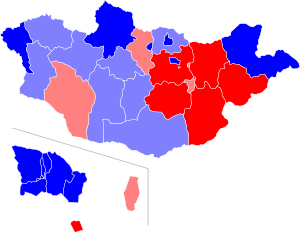Mongolian presidential election, 2013
|
|
|||||||||||||||||
|---|---|---|---|---|---|---|---|---|---|---|---|---|---|---|---|---|---|
|
|||||||||||||||||
|
Majority of the popular vote needed to prevent a run-off |
|||||||||||||||||
|
|||||||||||||||||

Province and Ulaanbaatar districts won by Elbegdorj (blue), Bat-Erdene (red). Darker shades represent a majority (more than half), lighter shades represent pluralities.
|
|||||||||||||||||
|
|||||||||||||||||
Presidential elections were held in Mongolia on 26 June 2013. The Democratic Party nominee, incumbent President Tsakhiagiin Elbegdorj was re-elected, defeating both Mongolian People's Party nominee of parliament member Badmaanyambuugiin Bat-Erdene and Mongolian People's Revolutionary Party nominee Natsagiin Udval, who was Minister of Health at the time of the election. Elbegdorj was inaugurated on 10 July 2013 for his second term in office.
Both Elbegdorj and Bat-Erdene saw backing from the urban population in Ulan Bator, Bat-Erdene having more of a conservative following and the incumbent president supported by the middle class. Elbegdorj won the election with 50.9% of the popular votes, a nearly 9% margin over Bat-Erdene. Udval received 6.6% of the popular vote. Elbegdorj's re-election keeps the Democratic Party in power both in the presidency and the State Great Khural.
The election was held using the two-round system; if no candidate had received a majority of the vote in the first round, a second round would have been held. The second round was to be scheduled on 10 July 2013 if necessary. Only parties with seats in the State Great Khural were allowed to nominate candidates.
The elections were the first in which Mongolians living abroad were allowed to vote, with an estimated 39,800 Mongolian citizens living outside Mongolia at the time of the election. Other reforms had been made since the 2012 parliamentary elections, including limits on money spent by candidates on campaigning and advertising. As in the 2012 elections, the presidential election used electronic voting machines from Dominion Voting Systems.
...
Wikipedia


